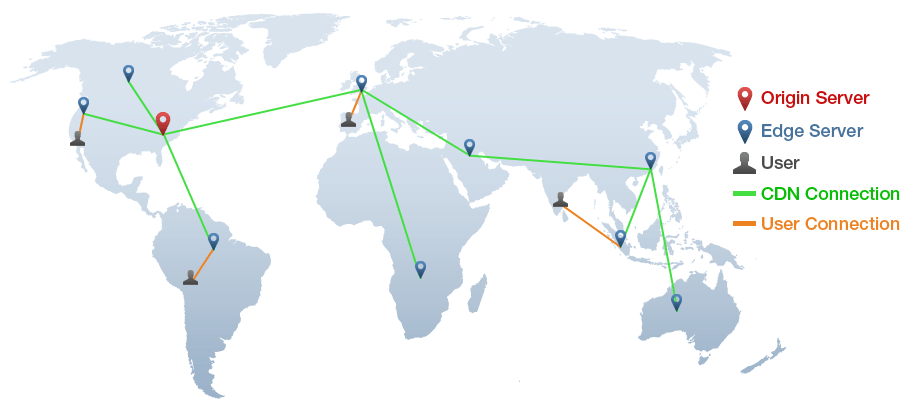Whether you have a simple, basic website that acts a “digital brochure and business card” or a fully designed, highly functional website that’s multi-faceted in its capabilities, site load speeds should be a constant concern. Even Google has said that recent data shows “40% of consumers will leave a page that takes longer than three seconds to load.” This is even more important to consider as more and more users turn to mobile for web browsing, where Google stated this number is as large as 53% of users that will leave a mobile page if it doesn’t load in three seconds or less.
Let’s briefly discuss what a CDN is and how it can be a vast improvement on your site speed, and an extension to your digital presence, without breaking the bank.
CDN stands for “Content Delivery Network” and, to spare you the long technical details, acts as basically a faster median between the user (your potential client or customer) and where your site is hosted. In many cases, a CDN server that belongs to a whole collection of servers around the globe is roughly in the middle of the connection, or at the very least closer than your hosting server is to them. The premise is that the CDN server will deliver a cached, or saved, version of your site to the user faster than your hosting server can drum up a slower, fresh copy, most likely from further away. There’s obviously more to it, but you get the picture. Actually, here’s a courtesy picture if you didn’t:

Image Source: https://gtmetrix.com/why-use-a-cdn.html
Examples of CDN services include Cloudflare, MaxCDN, and Amazon Web Services: Cloudfront CDN. There are many options out there but many of the most popular services have multiple servers in multiple countries all around the world. If North America is the only area your site should be appealing to, that shouldn’t be a problem, as there are probably more servers there than any other continent; depending on the service you end up going with, of course. That being said, pricing isn’t as budget-breaking as you would think.
A popular pricing model is basically “pay for the traffic you get” where it’s cents on the dollar per whichever unit of data they use to meter things. Other CDN services can start as a freemium, feature-lite plan and you pay for the features you need to add on later at an affordable per month fee. Some even offer very affordable SSL certificate add-ons (think secure https connection), which can save dozens of dollars per year in comparison and helps keep things organized in one place.
There’s really three key takeaways to why a CDN helps your site out, and they are:
1. Decreased bounce rates and improved conversions.
2. Following best SEO practices.
3. Having a safer, more reliable site to use as a tool.
First, improving site load speeds, as stated by Google, helps reduce the number of people that leave your site if they get impatient and fail to explore past your home page (a bounce). So the fewer bounces you get, the more potential sales conversions you can get. While there are never guarantees to how much a CDN will help for site speed, it’s worth looking into.
Second, Google has updated their Search Engine algorithms that weigh your site’s SEO efforts to the site along with factoring in site speed. So yes, it’s that important even for favorable Google search rankings.
Finally, CDNs offer layers of protection from hackers and spammers trying to take your site down and mess with it. Thus, having a safer, more reliable site means happier visitors and a happier you, especially if your website is a vital tool to your day-to-day business.
Don’t have a CDN setup for your site? What are you waiting for? Call us here at thirteen05 so we can discuss and help!
Sources:
https://www.thinkwithgoogle.com/articles/mobile-page-speed-load-time.html
https://www.thinkwithgoogle.com/articles/mobile-page-speed-new-industry-benchmarks.html









